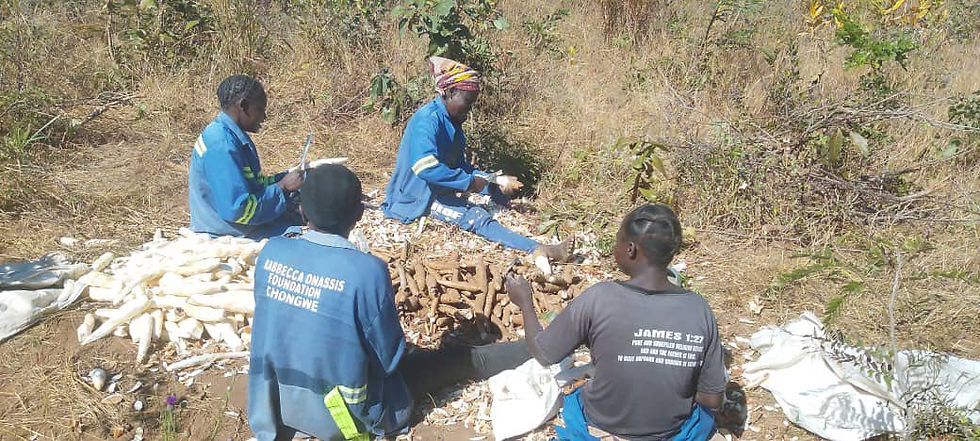Rooted in Hope: The Cassava Harvest at ROF
- J. KALUMBA

- Jun 17
- 2 min read

At the Rabbecca Onassis Foundation (ROF), nestled in the heart of Lusambo, Kawambwa District in northern Zambia, our commitment to cultivating both land and lives is as deep as the roots of the cassava we grow.
Cassava—locally known as "ubwali" in its meal form—is far more than a staple crop in Zambia. It is the lifeblood of entire communities, providing nourishment, economic opportunity, and cultural continuity. In Zambia, the average person consumes over 100 kilograms of cassava annually—five times the global average—yet challenges in processing, education, and sustainable agriculture still persist.
That’s where ROF steps in.

🍠 More Than a Harvest—It’s a Mission
This year’s cassava harvest at ROF was not just a success of yield, but of impact. Under the guidance of our founder, Judith Kalumba Onassis, and with the support of our local team, we’ve been expanding hands-on agricultural training for orphaned and vulnerable children in our care. Every child participates in the planting, weeding, and harvesting process—not just as laborers, but as learners.
Our hope is to equip the next generation with the knowledge and dignity that comes from growing their own food, understanding its economic value, and seeing themselves as contributors to their community’s well-being.

From Roots to Research: Why Science Matters
Recent studies out of the International Institute of Tropical Agriculture (IITA) in Lusaka have confirmed what many farmers have known intuitively: how cassava is processed deeply affects its nutritional value, shelf life, and economic potential.

The research, which evaluated multiple drying techniques across elite cassava clones, showed that simple improvements—such as the introduction of oven-drying or freeze-drying methods—can drastically enhance the starch content, sugar retention, and product quality of cassava flour. For us at ROF, these findings are transformational.
But here’s the gap: Most rural communities, including ours, still rely on basic sun-drying, which exposes crops to weather risks and nutrient loss. We know that with proper training, tools, and partnerships, we could implement more effective post-harvest processing methods—opening doors to income-generating microenterprises and improved food security.
The Need for Agricultural Education
Our farm is a place of safety and purpose—but it is still developing. We lack advanced tools, training resources, and on-site processing facilities. We dream of building:
A cassava innovation classroom to teach young people about crop science and business
Access to drying and milling equipment for small-scale flour production
A partnership network to help bring research-based methods into rural Zambia
We’re not asking for charity. We’re asking for collaboration. We know the value of cassava, and we are ready to scale our work to match its potential.

💡 A Call to Collaborate
Whether you’re a researcher, a donor, or a fellow changemaker—we invite you to stand with us. Help us turn ROF into a living model of what’s possible when science, community, and heart come together.
Let’s transform cassava from a survival crop into a symbol of innovation and hope.
📍 ROF Headquarters: Seattle, Washington | ROF Farm: Lusambo, Kawambwa, Zambia🌍 facebook.com/rabbeccaonassisfoundation📧 rabbeccaonassisfoundation@gmail.com



Comments